alice walker & her work修改版
Alice Walker简介
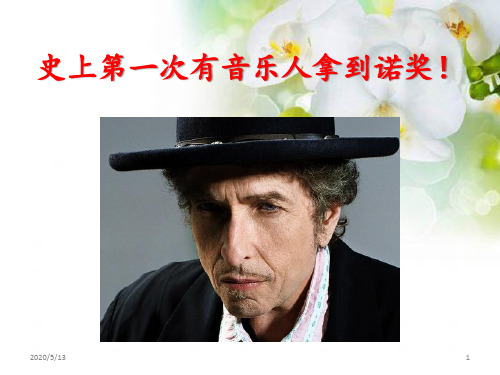
2016/12/8
18
The Pulitzer Prize for Fiction is one of the seven American Pulitzer Prizes that are annually awarded for Letters, Drama, and Music. It recognizes distinguished fiction by an American author, preferably dealing with American life, published during the preceding calendar year. 2016/12/8
19
The National Book Awards are a set of annual U.S. literary awards. At the final National Book Awards Ceremony every November, the National Book Foundation presents the National Book Awards and two lifetime achievement awards to authors.
2016/12/8 3
2016/12/8
4
Introduction Writing career Selected Awards and Honors The Color Purple
2016/12/8 5
Born:February 9, 1944 (age 72) Putnam County, Georgia, U.S.
• • • • • • • • • • • •
1988 — Living by the Word 1989 — The Temple of My Familiar 1991 — Her Blue Body Everything We Know: Earthling Poems 1965-1990 Complete 1991 — Finding the Green Stone 1992 — Possessing the Secret of Joy 1993 — Warrior Marks 1996 — Alice Walker: Banned 1996 — The Same River Twice: Honoring the Difficult 1997 — Anything We Love Can Be Saved: A Writer's Activism 1998 — By the Light of My Father's Smile 2000 — The Way Forward Is with a Broken Heart
爱丽丝,沃克紫色简介sunny.

◆亚马逊女性主义(Amazon feminism) ◆文化女性主义 ◆生态女性主义(ecofeminism) ◆自由意志女性主义(libertarian feminism)或个人女 性主义(individualist feminism) ◆唯物女性主义(material feminism) ◆性别女性主义 ◆法国女性主义 ◆大众女性主义(pop feminism) ◆自由女性主义 ◆马克思女性主义(Marxist feminism) ◆社会女性主义(socialist feminism) ◆激进女性主义(radical feminism) ◆性解放女性主义(sexually liberal feminism或sexpositive feminism) ◆心灵女性主义(spiritual feminism) ◆隔离女性主义 ◆第三世界女性主义 ◆跨性别女性主义(transfeminism)
我们可以找到她早年生活滞留下来的某些痛苦记忆以及她对这一段婚姻的反思。艾丽斯随后辞去工作 开始专职写作,在旧金山,她遇上《黑人学者》的编辑罗伯特·亚伦,不久即与之共同生活。
女性主义(女权运动、女权主义)是指一个主要以女性 经验为来源与动机的社会理论与政治运动。在对社会关 系进行批判之外,许多女性主义的支持者也着重于性别 不平等的分析以及推动妇女的权利、利益与议题。 女性主义理论的目的在于了解不平等的本质以及着重在 性别政治、权力关系与性意识(sexuality)之上。女性 主义政治行动则挑战诸如生育权、堕胎权、教育权、家 庭暴力、产假(maternity leave)、薪资平等、投票权、 性骚扰、性别歧视与性暴力等等的议题。女性主义探究 的主题则包括歧视、刻板印象、物化(尤其是关于性的 物化)、身体、家务分配、压迫与父权。 女性主义的观念基础是认为,现时的社会建立于一个男 性被给予了比女性更多特权的父权体系之上。 现代女性主义理论主要、但并非完全地出自于西方的中 产阶级学术界。不过,女性主义运动是一个跨越阶级与 种族界线的草根运动。每个文化下面的女性主义运动各 有其独特性,并且会针对该社会的女性来提出议题,比 如苏丹的性器割除(genital mutilation,请见女性割礼) 或北美的玻璃天花板效应(glass ceiling)。而如强奸、 乱伦与母职则是普世性的议题。
高级英语Unit4AliceWalker生平
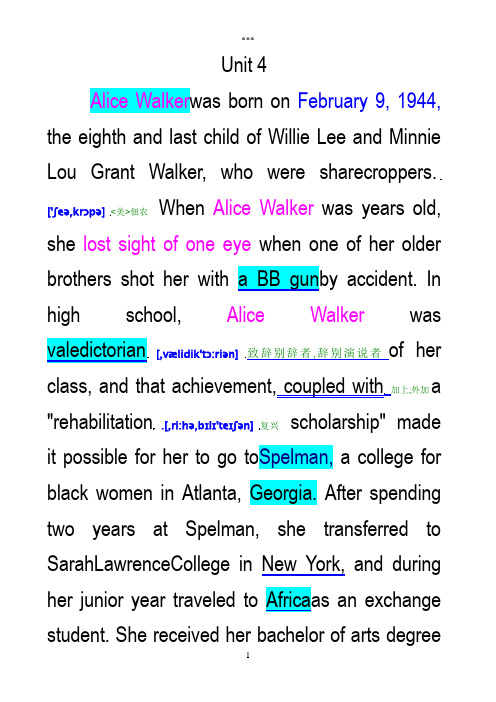
Unit 4Alice Walker was born on February 9, 1944, the eighth and last child of Willie Lee and Minnie Lou Grant Walker, who were sharecroppers. ['ʃeə,krɔpə] <美>佃农When Alice Walker was years old, she lost sight of one eye when one of her older brothers shot her with a BB gunby accident. In high school, Alice Walker was[,vælidik'tɔ:riən]致辞别辞者,辞别演说者of her,外加a"rehabilitation.[,ri:hə,bɪlɪ'teɪʃən]复兴scholarship" made it possible for her to go to Spelman, a college for black women in Atlanta, Georgia. After spending two years at Spelman, she transferred to SarahLawrenceCollege in New York, and during her junior year traveled to Africaas an exchange student. She received her bachelor of arts degreefrom SarahLawrenceCollege in 1965.After finishing college, Walker lived for a short time in New York, then from the mid 1960s to the mid 1970s,she lived in Tougaloo, Mississippi, during which time she had a daughter, Rebecca, in 1969. Alice Walker was active in the Civil Rights Movement of the 1960's, and in the 1990's she is still an involved activist. She has spoken for the women's movement,the anti-apartheid['æntiə'pɑ:θaid]反种族隔离的movement, for the anti-nuclear movement, and so on.Alice Walker started her own publishing company, Wild Trees Press, in 1984. She currently resides in Northern Californiawith her dog, Marley.She receivedthe Pulitzer Prize in 1983 for The Color Purple.Among her numerous awards and honors are the Lillian Smith Award from theNational Endowment[en'daʊmənt](经常的)资助,捐助;捐助的财物等for the Arts, the Rosenthal['rəuzəntɑ:l](陶瓷)罗森塔尔制造的Award from the National Institute of Arts & Letters, a nomination for the National Book Award, a Radcliffe['rædklif]拉德克利夫(姓氏)Institute Fellowship, a Merrill Fellowship, a Guggenheim ['ɡuɡənhaim]格瓦拉的追随者Fellowship, and the Front Page Award for Best Magazine Criticism from the Newswoman's Club of New York. She also has received the Townsend Prize and a Lyndhurst Prize.紫色?获得普利策文学奖,使艾丽丝·沃克声名鹊起,成为美国历史上第一位获此殊荣的黑人女作家。
Everyday Use-Alice Walker(《祖母的日常用品》爱丽丝.沃克)原版辅导教学问题
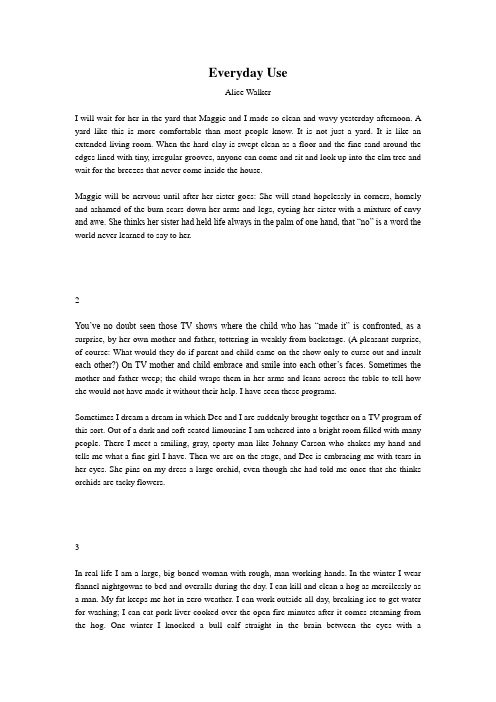
Everyday UseAlice WalkerI will wait for her in the yard that Maggie and I made so clean and wavy yesterday afternoon. A yard like this is more comfortable than most people know. It is not just a yard. It is like an extended living room. When the hard clay is swept clean as a floor and the fine sand around the edges lined with tiny, irregular grooves, anyone can come and sit and look up into the elm tree and wait for the breezes that never come inside the house.Maggie will be nervous until after her sister goes: She will stand hopelessly in corners, homely and ashamed of the burn scars down her arms and legs, eyeing her sister with a mixture of envy and awe. She thinks her sister had held life always in the palm of one hand, that “no” is a word the world never learned to say to her.--------------------------------------------------------------------------------2You’ve no doubt seen those TV shows where the child who has “made it” is confronted, as a surprise, by her own mother and father, tottering in weakly from backstage. (A pleasant surprise, of course: What would they do if parent and child came on the show only to curse out and insult each other?) On TV mother and child embrace and smile into each other’s faces. Sometimes the mother and father weep; the child wraps them in her arms and leans across the table to tell how she would not have made it without their help. I have seen these programs.Sometimes I dream a dream in which Dee and I are suddenly brought together on a TV program of this sort. Out of a dark and soft-seated limousine I am ushered into a bright room filled with many people. There I meet a smiling, gray, sporty man like Johnny Carson who shakes my hand and tells me what a fine girl I have. Then we are on the stage, and Dee is embracing me with tears in her eyes. She pins on my dress a large orchid, even though she had told me once that she thinks orchids are tacky flowers.--------------------------------------------------------------------------------3In real life I am a large, big-boned woman with rough, man-working hands. In the winter I wear flannel nightgowns to bed and overalls during the day. I can kill and clean a hog as mercilessly as a man. My fat keeps me hot in zero weather. I can work outside all day, breaking ice to get water for washing; I can eat pork liver cooked over the open fire minutes after it comes steaming from the hog. One winter I knocked a bull calf straight in the brain between the eyes with asledgehammer and had the meat hung up to chill before nightfall. But of course all this does not show on television. I am the way my daughter would want me to be: a hundred pounds lighter, my skin like an uncooked barley pancake. My hair glistens in the hot bright lights. Johnny Carson has much to do to keep up with my quick and witty tongue.But that is a mistake. I know even before I wake up. Who ever knew a Johnson with a quick tongue? Who can even imagine me looking a strange white man in the eye? It seems to me I have talked to them always with one foot raised in flight, with my head turned in whichever way is farthest from them. Dee, though. She would always look anyone in the eye. Hesitation was no part of her nature.--------------------------------------------------------------------------------4“How do I look, Mama?” Maggie says, showing just enough of her thin body enveloped in pink skirt and red blouse for me to know she’s there, almost hidden by the door.“Come out into the yard,” I say.Have you ever seen a lame animal, perhaps a dog run over by some careless person rich enough to own a car, sidle up to someone who is ignorant enough to be kind to him? That is the way my Maggie walks. She has been like this, chin on chest, eyes on ground, feet in shuffle, ever since the fire that burned the other house to the ground.Dee is lighter than Maggie, with nicer hair and a fuller figure. She’s a woman now, though sometimes I forget. How long ago was it that the other house burned? Ten, twelve years? Sometimes I can still hear the flames and feel Maggie’s arms sticking to me, her hair smoking and her dress falling off her in little black papery flakes. Her eyes seemed stretched open, blazed open by the flames reflected in them. And Dee. I see her standing off under the sweet gum tree she used to dig gum out of, a look of concentration on her face as she watched the last dingy gray board of the house fall in toward the red-hot brick chimney. Why don’t you do a dance around the ashes? I’d wanted to ask her. She had hated the house that much.--------------------------------------------------------------------------------5I used to think she hated Maggie, too. But that was before we raised the money, the church and me, to send her to Augusta to school. She used to read to us without pity, forcing words, lies, otherfolks’ habits, whole lives upon us two, sitting trapped and ignorant underneath her voice. She washed us in a river of make-believe, burned us with a lot of knowledge we didn’t necessarily need to know. Pressed us to her with the serious ways she read, to shove us away at just the moment, like dimwits, we seemed about to understand.Dee wanted nice things. A yellow organdy dress to wear to her graduation from high school; black pumps to match a green suit she’d made from an ol d suit somebody gave me. She was determined to stare down any disaster in her efforts. Her eyelids would not flicker for minutes at a time. Often I fought off the temptation to shake her. At sixteen she had a style of her own: and knew what style was.6I never had an education myself. After second grade the school closed down. Don’t ask me why: In 1927 colored asked fewer questions than they do now. Sometimes Maggie reads to me. She stumbles along good-naturedly but can’t see well. She knows she is not bright. Like good looks and money, quickness passed her by. She will marry John Thomas (who has mossy teeth in an earnest face), and then I’ll be free to sit here and I guess just sing church songs to myself. Although I never was a good singer. Never could carry a tune. I was always better at a man’s job. I used to love to milk till I was hooked in the side in ’49. Cows are soothing and slow and don’t bother you, unless you try to milk them the wrong way.I have deliberately turned my back on the house. It is three rooms, just like the one that burned, except the roof is tin; they don’t make shingle roofs anymore. There are no real windows, just some holes cut in the sides, like the port-holes in a ship, but not round and not square, with rawhide holding the shutters up on the outside. This house is in a pasture, too, like the other one. No doubt when Dee sees it she will want to tear it down. She wrote me once that no matter where we “choose” to live, she will manage to come see us. But she will never bri ng her friends. Maggie and I thought about this and Maggie asked me, “Mama, when did Dee ever have any friends?”--------------------------------------------------------------------------------7She had a few. Furtive boys in pink shirts hanging about on washday after school. Nervous girls who never laughed. Impressed with her, they worshiped the well-turned phrase, the cute shape, the scalding humor that erupted like bubbles in lye. She read to them.When she was courting Jimmy T, she didn’t have much time to pay to us but turned all her faultfinding power on him. He flew to marry a cheap city girl from a family of ignorant, flashy people. She hardly had time to recompose herself.When she comes, I will meet—but there they are!Maggie attempts to make a dash for the house, in her shuffling way, but I stay her with my hand. “Come back here,” I say. And she stops and tries to dig a well in the sand with her toe.It is hard to see them clearly through the strong sun. But even the first glimpse of leg out of the car tells me it is Dee. Her feet were always neat looking, as if God himself shaped them with a certain style. From the other side of the car comes a short, stocky man. Hair is all over his head a foot long and hanging from his chin like a kinky mule tail. I hear Maggie suck in her breath. “Uhnnnh” is what it sounds like. Like when you see the wriggling end of a snake just in front of your foot on the road. “Uhnnnh.”--------------------------------------------------------------------------------8Dee next. A dress down to the ground, in this hot weather. A dress so loud it hurts my eyes. There are yellows and oranges enough to throw back the light of the sun. I feel my whole face warming from the heat waves it throws out. Earrings gold, too, and hanging down to her shoulders. Bracelets dangling and making noises when she moves her arm up to shake the folds of the dress out of her armpits. The dress is loose and flows, and as she walks closer, I like it. I hear Maggie go “Uhnnnh” again. It is her sister’s hair. It stands straight up like the wool on a sheep. It is black as night and around the edges are two long pigtails that rope about like small lizards disappearing behind her ears.“Wa-su-zo-Tean-o!” she says, coming on in that g liding way the dress makes her move. The short, stocky fellow with the hair to his navel is all grinning, and he follows up with “Asalamalakim,1 my mother and sister!” He moves to hug Maggie but she falls back, right up against the back of my chair. I feel her trembling there, and when I look up I see the perspiration falling off her chin.--------------------------------------------------------------------------------9“Don’t get up,” says Dee. Since I am stout, it takes something of a push. You can see me trying to move a second or two before I make it. She turns, showing white heels through her sandals, andgoes back to the car. Out she peeks next with a Polaroid. She stoops down quickly and lines up picture after picture of me sitting there in front of the house with Maggie cowering behind me. She never takes a shot without making sure the house is included. When a cow comes nibbling around in the edge of the yard, she snaps it and me and Maggie and the house. Then she puts the Polaroid in the back seat of the car and comes up and kisses me on the forehead.Meanwhile, Asalamalakim is going through motions with Maggie’s hand. Maggie’s hand is as limp as a fish, and probably as cold, despite the sweat, and she keeps trying to pull it back. It looks like Asalamalakim wants to shake hands but wants to do it fancy. Or maybe he don’t know how people shake hands. Anyhow, he soon gives up on Maggie.“Well,” I say. “Dee.”“No, Mama,” she says. “Not ‘Dee,’ Wangero Leewanika Kemanjo!”--------------------------------------------------------------------------------10“What happened to ‘Dee’?” I wanted to know.“She’s dead,” Wangero said. “I couldn’t bear it any longer, being named after the people who oppress me.”“You know as well as me you w as named after your aunt Dicie,” I said. Dicie is my sister. She named Dee. We called her “Big Dee” after Dee was born.“But who was she named after?” asked Wangero.“I guess after Grandma Dee,” I said.“And who was she named after?” asked Wangero.“Her mother,” I said, and saw Wangero was getting tired. “That’s about as far back as I can traceit,” I said. Though, in fact, I probably could have carried it back beyond the Civil War through the branches.“Well,” said Asalamalakim, “there you are.”“Uhnnnh,” I heard Maggie say.11“There I was not,” I said, “before ‘Dicie’ cropped up in our family, so why should I try to trace it that far back?”He just stood there grinning, looking down on me like somebody inspecting a Model A car. Every once in a while he and Wangero sent eye signals over my head.“How do you pronounce this name?” I asked.“You don’t have to call me by it if you don’t want to,” said Wangero.“Why shouldn’t I?” I asked. “If that’s what you want us to call you, we’ll call you.”“I know it might sound awkward at first,” said Wangero.“I’ll get used to it,” I said. “Ream it out again.”Well, soon we got the name out of the way. Asalamalakim had a name twice as long and three times as hard. After I tripped over it two or three times, he told me to just call him Hakim-a-barber.I wanted to ask him was he a barber, but I didn’t really think he was, so I didn’t ask.--------------------------------------------------------------------------------12“You must belong to those beef-cattle peoples down the road,” I said. They said “Asalamalakim”when they met you, too, but they didn’t shake hands. Always too busy: feeding the cattle, fixing the fences, putting up salt-lick shelters, throwing down hay. When the white folks poisoned some of the herd, the men stayed up all night with rifles in their hands. I walked a mile and a half just to see the sight.Hakim-a-barber said, “I accept some of their doctrines, but farming and raising cattle is not my style.” (They didn’t tell me, and I didn’t ask, whether Wangero—Dee—had really gone and married him.)We sat down to eat and right away he said he didn’t eat collards, and pork was unclean. Wangero, though, went on through the chitlins and corn bread, the greens, and everything else. She talked a blue streak over the sweet potatoes. Everything delighted her. Even the fact that we still used the benches her daddy made for the table when we couldn’t afford to buy chairs.--------------------------------------------------------------------------------13“Oh, Mama!” she cried. Then turned to Hakim-a-barber. “I never knew how lovely these benches are. You can feel the rump prints,” she said, running her hands underneath her and along the bench. Then she gave a sigh, and her hand closed over Grandma Dee’s butter dish. “That’s it!” she said. “I knew there was something I wanted to ask you if I could have.” She jumped up from the table and went over in the corner where the churn stood, the milk in it clabber2 by now. She looked at the churn and looked at it.“This churn top is what I need,” she said. “Didn’t Uncle Buddy whittle it out of a tree you all used to have?”“Yes,” I said.“Uh huh,” she said happily. “And I want the dasher,3 too.”“Uncle Buddy whittle that, too?” asked the barber.Dee (Wangero) looked up at me.“Aunt Dee’s first husband whittled the dash,” said Maggie so low you almost couldn’t hear her.“His name was Henry, but they called him Stash.”--------------------------------------------------------------------------------14“Maggie’s brain is like an elephant’s,” Wangero said, laughing. “I can use the churn top as a centerpiece for the alcove table,” she said, sliding a plate over the churn, “and I’ll think of something artistic to do with the dasher.”When she finished wrapping the dasher, the handle stuck out. I took it for a moment in my hands. You didn’t even have to look close to see where hands pushing the dasher up and down to make butter had left a kind of sink in the wood. In fact, there were a lot of small sinks; you could see where thumbs and fingers had sunk into the wood. It was beautiful light-yellow wood, from a tree that grew in the yard where Big Dee and Stash had lived.After dinner Dee (Wangero) went to the trunk at the foot of my bed and started rifling through it. Maggie hung back in the kitchen over the dishpan. Out came Wangero with two quilts. They had been pieced by Grandma Dee, and then Big Dee and me had hung them on the quilt frames on the front porch and quilted them. One was in the Lone Star pattern. The other was Walk Around the Mountain. In both of them were scraps of dresses Grandma Dee had worn fifty and more years ago. Bits and pieces of Grandpa Jarrell’s paisley shirts. And one teeny faded blue piece, about the size of a penny matchbox, that was from Great Grandpa Ezra’s uniform that he wore in the Civil War.--------------------------------------------------------------------------------15“Mama,” Wangero said sweet as a bird. “Can I have these old quilts?”I heard something fall in the kitchen, and a minute later the kitchen door slammed.“Why don’t you take one or two of the others?” I asked. “These old things was just done by me and Big Dee from some tops your grandma pieced befor e she died.”“No,” said Wangero. “I don’t want those. They are stitched around the borders by machine.”“That’ll make them last better,” I said.“That’s not the point,” said Wangero. “These are all pieces of dresses Grandma used to wear. She did a ll this stitching by hand. Imagine!” She held the quilts securely in her arms, stroking them.16“Some of the pieces, like those lavender ones, come from old clothes her mother handed down to her,” I said, moving up to touch the quilts. Dee (Wangero) mo ved back just enough so that I couldn’t reach the quilts. They already belonged to her.“Imagine!” she breathed again, clutching them closely to her bosom.“The truth is,” I said, “I promised to give them quilts to Maggie, for when she marries John T homas.”She gasped like a bee had stung her.“Maggie can’t appreciate these quilts!” she said. “She’d probably be backward enough to put them to everyday use.”“I reckon she would,” I said. “God knows I been saving ’em for long enough with nobody using ’em. I hope she will!” I didn’t want to bring up how I had offered Dee (Wangero) a quilt when she went away to college. Then she had told me they were old-fashioned, out of style.--------------------------------------------------------------------------------17“But they’re priceless!” she was saying now, furiously; for she has a temper. “Maggie would put them on the bed and in five years they’d be in rags. Less than that!”“She can always make some more,” I said. “Maggie knows how to quilt.”D ee (Wangero) looked at me with hatred. “You just will not understand. The point is these quilts, these quilts!”“Well,” I said, stumped. “What would you do with them?”“Hang them,” she said. As if that was the only thing you could do with quilts.Maggie by now was standing in the door. I could almost hear the sound her feet made as they scraped over each other.“She can have them, Mama,” she said, like somebody used to never winning anything or having anything reserved for her. “I can ’member Grandma Dee without the quilts.”--------------------------------------------------------------------------------18I looked at her hard. She had filled her bottom lip with checkerberry snuff, and it gave her face a kind of dopey, hangdog look. It was Grandma Dee and Big Dee who taught her how to quilt herself. She stood there with her scarred hands hidden in the folds of her skirt. She looked at her sister with something like fear, but she wasn’t mad at her. This was Maggie’s portion. This was the way she knew God to work.When I looked at her like that, something hit me in the top of my head and ran down to the soles of my feet. Just like when I’m in church and the spirit of God touches me and I get happy and shout. I did something I never had done before: hugged Maggie to me, then dragged her on into the room, snatched the quilts out of Miss Wangero’s hands, and dumped them into Maggie’s lap. Maggie just sat there on my bed with her mouth open.“Take one or two of the others,” I said to Dee.But she turned without a word and went out to Hakim-a-barber.--------------------------------------------------------------------------------19“You just don’t understand,” she said, as Maggie and I came out to the car.“What don’t I understand?” I wanted to know.“Your heritage,” she said. And then she turned to Maggie, kissed her, and said, “You ought to try to make something of yourself, too, Maggie. It’s really a new day for us. But from the way you and Mama still live, you’d never know it.”She put on some sunglasses that hid everything above the tip of her nose and her chin.Maggie smiled, maybe at the sunglasses. But a real smile, not scared. After we watched the car dust settle, I asked Maggie to bring me a dip of snuff. And then the two of us sat there just enjoying, until it was time to go in the house and go to bed.--------------------------------------------------------------------------------Making MeaningsEveryday UseReading Checka. According to Mama, how is Dee different from her and from Maggie?b. How would Maggie and Dee use the quilts differently?c. When she was a child, something terrible happened to Maggie. What was it?d. How did the mother choose to resolve the conflict over the quilts?e. Find the passage in the text that explains the title .First Thoughts1. Which character did you side with in the conflict over the quilts, and why?Shaping Interpretations2. What do you think is the source of the conflict in this story? Consider:3. Dee is re ferred to as the child who has “made it.” What do you think that means, and what signs tell you that she has “made it”?4. Use a diagram like the one on the right to compare and contrast Dee and Maggie. What is themost significant thing they have in common? What is their most compelling difference?5. Near the end of the story, Dee accuses Mama of not understanding their African American heritage. Do you agree or disagree with Dee, and why?6. Has any character changed by the end of the story? Go back to the text and find details to support your answer.7. Why do you think Alice Walker dedicated her story “For Your Grandmama”?Extending the Text8. What do you think each of these three women will be doing ten years after the story ends?9. This story takes place in a very particular setting and a very particular culture. Talk about whether or not the problems faced by this family could be experienced by any family, anywhere.Challenging the Text10. Do you think Alice Walker chose the right narrator for her story? How would the story differ if Dee or Maggie were telling it, instead of Mama? (What would we know that we don’t know now?)来源网址:/books/Elements_of_Lit_Cours e4/Collection%201/Everyday%20Use%20p4.htm。
Alice-Walker作品简介只是分享

Feminist , feminism
《紫色》1983年一举拿下代表美国文学最 高荣誉的三大奖:普利策奖(Pulitzer Prize)、美国国家图书奖(The National Book Awards)、全国书评家协会奖 (NBCC Award)。
@@中国日报网站消息:美国 图书馆协会(ALA)日前公布研究 报告,黑人女作家艾丽丝·沃克 的小说《紫色》竟然与《哈 利·波特》、《魔戒》、《傲慢 与偏见》和莎士比亚戏剧一起, 成为被重读次数最多的文学作 品
3.此外,“紫色”除了象征生命的尊严和人类的希 望外, 紫色还是女同性恋主义的标志。书中对茜莉 和莎格·艾微利( Shug Avery) 的同性恋描写与严 格意义上的同性恋性关系是有区分的, 激进女权主 义者们声称, 女同性恋者实际上是自发的、“下意 识”的女权主义者,
---因此, 沃克大胆借用“紫色”为书 名,“把跪着的女性拉起来, 把她们提到 了王权的高度”, 让黑人妇女也享有帝 王般的尊严和社会地位。
Meridian is a heartfelt and moving story about one woman's personal revolution as she joins the Civil Rights Movement. Set in the American South in the 1960s it follows Meridian Hill, a courageous young woman who dedicates herself heart and soul to her civil rights work, touching the lives of those around her even as her own health begins to deteriorate. Hers is a lonely battle, but it is one she will not abandon, whatever the costs. This is classic Alice Walker, beautifully written, intense and passionate.
ALice-walker介绍
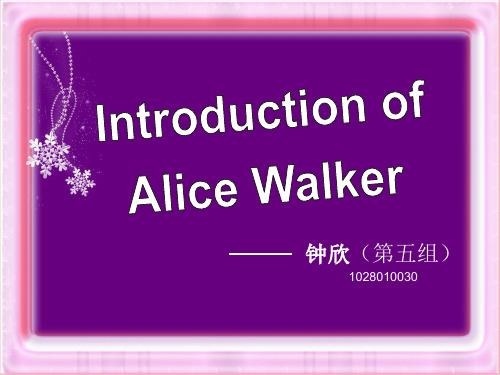
Biography
1. Alice Walker’s Early Life
Date of Birth: February 9, 1944 Birthplace: Eatonton, Georgia Parents: Willie Lee and Minnie Lou Grant Walker, who were sharecroppers<美>佃农 Marriage: (1967-1976)Mel Leventhal列文斯尔 a Jewish Civil Rights activist/ lawyer Child: Rebecca born in 1969
Alice walker
生平简介 主要作品
Main works
biography
作品思想
The themes of
her essays
所获奖项
Awards
课文主旨
作品思想 The themes of her essays
• Many of her novels depict (描述) women in other periods of history writing, such portrayals give a sense of the differences and similarities of women’s condition today and in that other time. Alice walker continues not only to write, but to be active in environmental, feminist causes, and issues of economic justice
Alice walker
Everyday Use for Grandma (Alice Walker)
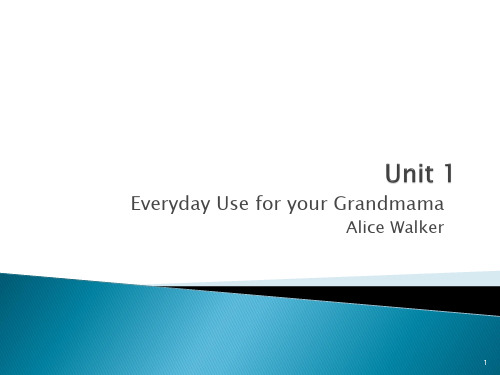
At the start of the novel, Celie views God as completely separate from her world. She writes to God because she has no other way to express her feelings. Celie's writing to God thrusts her into a rich symbolic life which results in her repudiation of the life she has been assigned and a desire for a more expansive daily existence.Her faith is strong, but it’s dependent on only what other people have revealed to her about God. Later she tells Shug that she sees God as a white man. She has this belief because everyone she knows has said God is white and a male. Later, Shug tells her God has no race or gender. This enables Celie to see God in a different way. She realizes that you cannot place qualities on God because God is a part of the unknown. Her faith is now based on her interpretation of God, not one she learned from someone else. Even though Shug helped her with this realization, Celie only used this knowledge to shape her faith. Shug was a huge influence on Celie’s faith, but Celie was the one that had to choose how she would express it.
ALICE WALKER 作者 Everyday Use 课文简介

Made by 少媚、瑞冰
Everyday Use
Biography
CHILDHOOD
born in Eatonton, Georgia , on February, 1944 youngest of eight children, grew up mostly with her 5 oldest brothers 1952-her brother shot her eye out with a BB gun blinding her one eye
Collision
Hope of preserving the black’s culture
✔ ✔ ✔ ✔ ✔ ✔ ✔
Rape Sexism Racism Violence Isolation Troubled relationships Multi-generational perspectives
Walker’s publishing
1968 Once (poetry)
1970-The Third
Mom Maggie Dee
conflict
different views on the African culture
◈ narrator of the story ◈ a typical black woman
◈ little education, poor, strong ◈ hard-working, independent,
♦ short story, widely studied
♦ first published in 1973 as part of In Love and
ALice-walker介绍

钟欣(第五组)
1028010030
CHENLI
1
Alice walker
生平简介 biography
主要作品
Main works
作品思想
The themes of her essays
所获奖项
Awards
课文主旨
2021/3/7
CHENLI
2
Biography
1. Alice Walker’s Early Life
2021/3/7
CHENLI
16
Alice walker
生平简介
主要作品
biography
Main works
作品思想
The themes of her essays
所获奖项
Awards
课文主旨
2021/3/7
CHENLI
17
2021/3/7
CHENLI
钟欣(第五组)
1028010030
19
Байду номын сангаас
today and in that other time. Alice walker
continues not only to write, but to be
active in environmental, feminist causes,
and issues of economic justice
Child:
Rebecca born in 1969
2. Education:
1961-1963 Spelman, a college for black women in Atlanta
1963-1965 Sarah Lawrence College in New
alice walker爱丽丝沃克
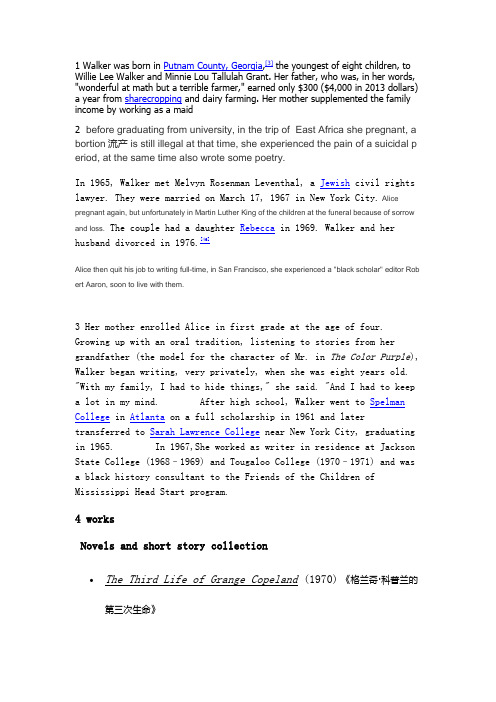
1 Walker was born in Putnam County, Georgia,[3] the youngest of eight children, to Willie Lee Walker and Minnie Lou Tallulah Grant. Her father, who was, in her words, "wonderful at math but a terrible farmer," earned only $300 ($4,000 in 2013 dollars)a year from sharecropping and dairy farming. Her mother supplemented the family income by working as a maid2 before graduating from university, in the trip of East Africa she pregnant, a bortion流产 is still illegal at that time, she experienced the pain of a suicidal p eriod, at the same time also wrote some poetry.In 1965, Walker met Melvyn Rosenman Leventhal, a Jewish civil rights lawyer. They were married on March 17, 1967 in New York City. Alice pregnant again, but unfortunately in Martin Luther King of the children at the funeral because of sorrow and loss. The couple had a daughter Rebecca in 1969. Walker and her husband divorced in 1976.[46]Alice then quit his job to writing full-time, in San Francisco, she experienced a "black scholar" editor Rob ert Aaron, soon to live with them.3 Her mother enrolled Alice in first grade at the age of four. Growing up with an oral tradition, listening to stories from her grandfather (the model for the character of Mr. in The Color Purple), Walker began writing, very privately, when she was eight years old. "With my family, I had to hide things," she said. "And I had to keep a lot in my mind. After high school, Walker went to Spelman College in Atlanta on a full scholarship in 1961 and latertransferred to Sarah Lawrence College near New York City, graduating in 1965. In 1967,She worked as writer in residence at Jackson State College (1968–1969) and Tougaloo College (1970–1971) and was a black history consultant to the Friends of the Children of Mississippi Head Start program.4 worksNovels and short story collectionThe Third Life of Grange Copeland (1970)《格兰奇·科普兰的第三次生命》∙In Love and Trouble: Stories of Black Women (1973)∙Meridian梅丽迪安(1976)∙The Color Purple紫色(1982)∙You Can't Keep a Good Woman Down: Stories (1982)∙To Hell With Dying (1988)∙The Temple of My Familiar (1989)∙Finding the Green Stone (1991)∙Possessing the Secret of Joy (1992)∙The Complete Stories (1994)∙By The Light of My Father's Smile (1998)∙The Way Forward Is with a Broken Heart (2000)∙Now Is The Time to Open Your Heart [a novel] (2004) Random House ISBN13 9781588363961∙Everyday Use (1973). Short stories, essays, interviews 个人简介Alice WalkerAKA Alice Malsenior WalkerBorn: 9-Feb-1944Birthplace: Eatonton, GAGender: FemaleReligion: BuddhistRace or Ethnicity: BlackSexual orientation: Bisexual [1]Occupation: AuthorNationality: United State奖项Pulitzer Prize for Fiction 1983 for The Color PurpleNational Book Award for Fiction 1983 for The Color PurpleHumanist of the Year 1997Ms. EditorKucinich for PresidentPeace Action 50th Anniversary Honorary Host Committee (2007)。
高级英语(4.2.2)--AliceWalker
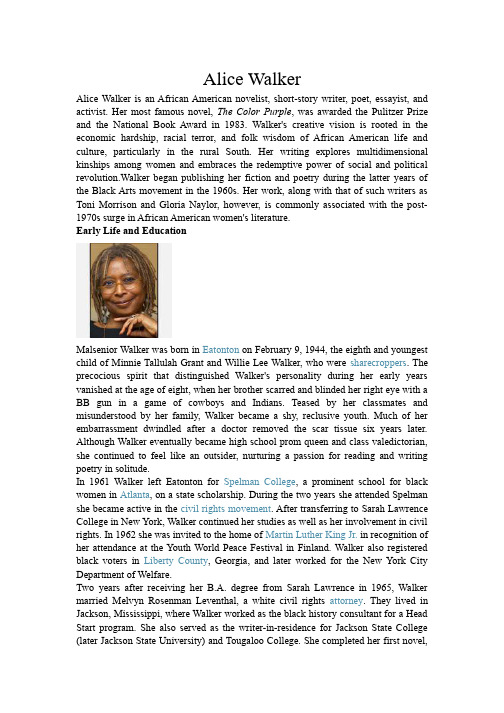
Alice WalkerAlice Walker is an African American novelist, short-story writer, poet, essayist, and activist. Her most famous novel,The Color Purple, was awarded the Pulitzer Prize and the National Book Award in1983. Walker's creative vision is rooted in the economic hardship,racial terror,and folk wisdom of African American life and culture,particularly in the rural South.Her writing explores multidimensional kinships among women and embraces the redemptive power of social and political revolution.Walker began publishing her fiction and poetry during the latter years of the Black Arts movement in the 1960s. Her work, along with that of such writers as Toni Morrison and Gloria Naylor, however, is commonly associated with the post-1970s surge in African American women's literature.Early Life and EducationMalsenior Walker was born in Eatonton on February 9, 1944, the eighth and youngest child of Minnie Tallulah Grant and Willie Lee Walker, who were sharecroppers. The precocious spirit that distinguished Walker's personality during her early years vanished at the age of eight, when her brother scarred and blinded her right eye with a BB gun in a game of cowboys and Indians.Teased by her classmates and misunderstood by her family, Walker became a shy, reclusive youth. Much of her embarrassment dwindled after a doctor removed the scar tissue six years later. Although Walker eventually became high school prom queen and class valedictorian, she continued to feel like an outsider, nurturing a passion for reading and writing poetry in solitude.In 1961 Walker left Eatonton for Spelman College, a prominent school for black women in Atlanta, on a state scholarship. During the two years she attended Spelman she became active in the civil rights movement. After transferring to Sarah Lawrence College in New York, Walker continued her studies as well as her involvement in civil rights. In 1962 she was invited to the home of Martin Luther King Jr. in recognition of her attendance at the Youth World Peace Festival in Finland. Walker also registered black voters in Liberty County, Georgia, and later worked for the New York City Department of Welfare.Two years after receiving her B.A. degree from Sarah Lawrence in 1965, Walker married Melvyn Rosenman Leventhal, a white civil rights attorney. They lived in Jackson, Mississippi, where Walker worked as the black history consultant for a Head Start program. She also served as the writer-in-residence for Jackson State College (later Jackson State University) and Tougaloo College. She completed her first novel,The Third Life of Grange Copeland, in 1969, the same year that her daughter, Rebecca Grant, was born. When her marriage to Leventhal ended in 1977, Walker moved to northern California, where she lives and writes today.Walker has taught African American women's studies to college students at Wellesley, the University of Massachusetts at Boston, Yale, Brandeis, and the University of California at Berkeley. She supports antinuclear and environmental causes, and her protests against the oppressive rituals of female circumcision in Africa and the Middle East make her a vocal advocate for international women's rights. Walker has served as a contributing editor of Ms. magazine, and she is a cofounder of Wild Tree Press. Walker's appreciation for her matrilineal literary history is evidenced by the numerous reviews and articles she has published to acquaint new generations of readers with writers like Zora Neale Hurston. The anthology she edited, I Love Myself When I Am Laughing... and Then Again When I Am Looking Mean and Impressive: A Zora Neale Hurston Reader(1979), was particularly instrumental in bringing Hurston's work back into print. In addition to her deep admiration for Hurston, Walker's literary influences include Harlem Renaissance writer Jean Toomer,black Chicago poet Gwendolyn Brooks, South African novelist Bessie Head, and white Georgia writer Flannery O'Connor.PoetryThe poems in Walker's first volume, Once (1968), are based on her experiences during the civil rights movement and her travels to Africa. Influenced by Japanese haiku and the philosophy of author Albert Camus, Once also contains meditations on love and suicide. Indeed, after Walker visited Africa during the summer of 1964, she had struggled with an unwanted pregnancy upon her return to college. She speaks openly in her writing about the mental and physical anguish she experienced before deciding to have an abortion. The poems in Once grew not only from the sorrowful period in which Walker contemplated death but also from her triumphant decision to reclaim her life.Revolutionary PetuniasMany of the narrative poems of her second volume,Revolutionary Petunias and Other Poems (1973), revisit her southern past, while other verses challenge superficial political militancy. The collection won the Lillian Smith Book Award (named for Georgia writer Lillian Smith and administered by the Southern Regional Council) in 1973. Good Night, Willie Lee, I'll See You in the Morning (1979) contains tributes to black political leaders and creative writers. In addition to a fourth volume of poetry, Horses Make a Landscape Look More Beautiful(1984), Walker has compiled her previously published verses in the collection Her Blue Body Everything We Know:Earthling Poems 1965-1990 Complete(1991). In a review of Absolute Trust in the Goodness of the Earth:New Poems(2003),Publishers Weekly highlighted the volume's spiritual and ecological topics and added that Walker"explor[es]and prais[es] friendship, romantic love, home cooking, the peace movement, ancestors, ethnic diversity,and particularly admirable strong women,among them the primatologist Jane Goodall."Walker's most recent volume of poems,A Poem Traveled Down My Arm, was published in 2005.Short Fiction and EssaysOne of Walker's earliest stories, "To Hell with Dying," captured the attention of poet Langston Hughes, who included it in his 1967 anthology, The Best Short Stories by Negro Writers. In the tale, which is based on actual events, the joy and laughter of children rescue an old guitar player named Mr. Sweet from the brink of death year after year. The narrator—a girl at the start of the story—returns home as a young woman to "revive" Mr. Sweet, but with no success. After his death she inherits the bluesman's guitar and his enduring legacy of love."To Hell with Dying" was reprinted in Walker's first collection of short fiction,In Love and Trouble: Stories of Black Women (1973). The thirteen stories in this volume feature black women struggling to transcend society's narrow definitions of their intelligence and virtue. Her second collection, You Can't Keep a Good Woman Down: Stories (1982), continues her vivid portrayal of women's experiences by emphasizing such sensitive issues as rape and abortion. In 2000 Walker published a third collection of stories,The Way Forward Is with a Broken Heart. She has also written four children's books, including an illustrated version of To Hell with Dying(1988) and Finding the Green Stone (1991).Walker has published several volumes of essays and autobiographical reflections. In the1983collection In Search of Our Mothers'Gardens:Womanist Prose,she introduced readers to a new ideological approach to feminist thought.Her term womanist characterizes black feminists who cherish women's creativity, emotional flexibility, and strength.Womanism is further used to suggest new ways of reading silence and subjugation in narratives of male domination. The collection won the Lillian Smith Book Award in 1984. Other essay collections include The Same River Twice: Honoring the Difficult (1996), which features Walker's account of her struggle with Lyme disease during the filming of The Color Purple, and Sent by Earth: A Message from the Grandmother Spirit: After the Attacks on the World Trade Center and Pentagon (2002).NovelsLike her short stories, Walker's six novels place more emphasis on the inner workings of African American life than on the relationships between blacks and whites. Her first book,The Third Life of Grange Copeland(1970),details the sorrow and redemption of a rural black family trapped in a multigenerational cycle of violence and economic dependency. Walker also fictionalizes a young civil rights activist's coming-of-age in the novel Meridian (1976).The Color Purple (1982) has generated the most public attention as a book and as a major motion picture, directed by Steven Spielberg in 1985. Narrated through thevoice of Celie, The Color Purple is an epistolary novel—a work structured through a series of letters. Celie writes about the misery of childhood incest, physical abuse, and loneliness in her "letters to God." After being repeatedly raped by her stepfather, Celie is forced to marry a widowed farmer with three children. Yet her deepest hopes are realized with the help of a loving community of women, including her husband's mistress, Shug Avery, and Celie's sister, Nettie. Celie gradually learns to see herself as a desirable woman, a healthy and valuable part of the universe.Set in rural Georgia during segregation,The Color Purple brings components of nineteenth-century slave autobiography and sentimental fiction together with a confessional narrative of sexual awakening. Walker's harshest critics have condemned her portrayal of black men in the novel as "male-bashing," but others praise her forthright depiction of taboo subjects and her clear rendering of folk idiom and dialect. In 1985 the novel was adapted into a film, directed by Steven Spielberg. The musical stage adaptation premiered at the Alliance Theatre in Atlanta in 2004 and opened on Broadway in 2005.Literary scholars often link The Color Purple with Walker's next two novels in an informal trilogy. Celie's granddaughter, Fanny, is a major character in The Temple of My Familiar(1989), and the protagonist of Possessing the Secret of Joy(1992) is Tashi, the African wife of Celie's son. In Walker's novel By the Light of My Father's Smile (1998), strong sexual and religious themes intersect in a tale narrated from both sides of the grave. The novel features a family of African American anthropologists who journey to Mexico to study a tribe descended from former black slaves and Native Americans. In Now Is the Time to Open Your Heart (2004) the main character, Kate, embarks on a literal and spiritual journey to find a way to accept the aging process. Walker says that Kate's search is necessary because the territory is largely "uncharted," and "people seem to lose their imagination about what women's lives can be after, say, 55 or 60."Reflecting on the unique perspective and versatility of her literary career, Walker says, "One thing I try to have in my life and my fiction is an awareness of and openness to mystery, which, to me, is deeper than any politics, race, or geographical location." With elements of ancestral fable and spirituality, womanist insight, literary realism, and the grotesque, Walker's writing embodies an abundant cultural landscape of its own.In2001Walker was inducted into the Georgia Writers Hall of Fame.Emory University in Atlanta acquired Walker's personal and literary archives in 2007 and began cataloging her papers the following year.。
翻译TheColorPurplebyAliceWalker
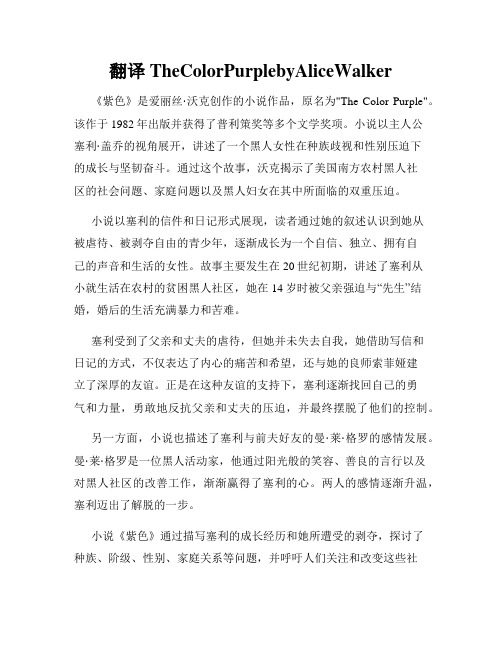
翻译TheColorPurplebyAliceWalker 《紫色》是爱丽丝·沃克创作的小说作品,原名为"The Color Purple"。
该作于1982年出版并获得了普利策奖等多个文学奖项。
小说以主人公塞利·盖乔的视角展开,讲述了一个黑人女性在种族歧视和性别压迫下的成长与坚韧奋斗。
通过这个故事,沃克揭示了美国南方农村黑人社区的社会问题、家庭问题以及黑人妇女在其中所面临的双重压迫。
小说以塞利的信件和日记形式展现,读者通过她的叙述认识到她从被虐待、被剥夺自由的青少年,逐渐成长为一个自信、独立、拥有自己的声音和生活的女性。
故事主要发生在20世纪初期,讲述了塞利从小就生活在农村的贫困黑人社区,她在14岁时被父亲强迫与“先生”结婚,婚后的生活充满暴力和苦难。
塞利受到了父亲和丈夫的虐待,但她并未失去自我,她借助写信和日记的方式,不仅表达了内心的痛苦和希望,还与她的良师索菲娅建立了深厚的友谊。
正是在这种友谊的支持下,塞利逐渐找回自己的勇气和力量,勇敢地反抗父亲和丈夫的压迫,并最终摆脱了他们的控制。
另一方面,小说也描述了塞利与前夫好友的曼·莱·格罗的感情发展。
曼·莱·格罗是一位黑人活动家,他通过阳光般的笑容、善良的言行以及对黑人社区的改善工作,渐渐赢得了塞利的心。
两人的感情逐渐升温,塞利迈出了解脱的一步。
小说《紫色》通过描写塞利的成长经历和她所遭受的剥夺,探讨了种族、阶级、性别、家庭关系等问题,并呼吁人们关注和改变这些社会问题。
故事中的塞利象征着黑人妇女的独立和坚韧,她们经历了一系列斗争和磨难,最终实现了内心的自由和解放。
沃克通过细腻的笔触和独特的叙述方式,引导读者思考种族和性别之间的交叉问题,以及社会的不公和压迫对个体生命的摧残。
小说并没有给出简单的答案和解决方案,而是通过对塞利等人的塑造和生活经历的描绘,希望唤醒读者对这些问题的思考和关注。
艾丽斯·沃克《紫色》的象征隐喻解析

艾丽斯·沃克《紫色》的象征隐喻解析关键词:黑人文化女性主义象征隐喻摘要:美国黑人文学的女性代表作家艾丽斯·沃克以黑人民族的独特文化内涵来彰显“黑人美”。
在长篇小说《紫色》中,她成功运用了黑人文学最突出的艺术手法——象征隐喻。
基于盖茨的喻指理论,对《紫色》中的象征隐喻艺术手法进行了解析。
非洲裔美国黑人女作家艾丽斯·沃克(Alice Walker)出生于美国黑人聚居的佐治亚州的贫困乡村,自幼耳闻目睹南方黑人的悲惨生活,尤其是黑人妇女,她们遭受双重压迫——一方面受到白人社会的歧视,另一方面又忍受着黑人男性的欺压,因为黑人社会也沿袭了白人社会对待男性和女性的双重标准。
正如胡克斯所说,“黑人妇女不仅在白人统治者手下受折磨,而且也在黑人男人手下受折磨。
”在大学时代,沃克就积极参加民权运动,并立志将争取种族平等和黑人妇女解放作为自己的终身事业。
因此,沃克的小说创作始终植根于美国黑人的文化传统,美国黑人,尤其是美国黑人妇女的历史、命运和前途是其小说创作的主题,她关注的焦点主要集中在处于社会最底层的黑人妇女的命运和她们的精神世界。
与同时代的美国黑人女作家托尼·莫里森一道,沃克把黑人女性推上了美国文学,特别是美国黑人文学的殿堂,让世人听到了她们的呻吟和呐喊。
美国黑人评论家玛丽·海伦·华盛顿称沃克为黑人妇女的“辩护士”,说她是“为了捍卫一个事业或一种立场而发言写作的”。
沃克的代表作长篇小说《紫色》为读者建构了一个在异质文化侵蚀下怪诞、变形的黑人世界,成功地塑造了主人公茜莉在白人社会和黑人男性双重压迫下寻找自我、重塑自我,从而获得新生的艰难历程。
《紫色》连获美国三项大奖——普利策奖、美国图书奖、全国图书评委协会奖,细细品味,我们不难发现:小说采用书信体形式的叙述方式,运用娴熟的黑人民间口语和象征隐喻的手法刻画人物并探寻人物的心灵,人物形象鲜活生动,栩栩如生;作者不是仅仅停留在描写黑人妇女的悲惨生活上,而是深入探讨黑人女性遭受不公平待遇的社会历史根源,并寻求解决途径——妇女之间的互爱互助是她们获得幸福和自的最佳手段。
alice walker简介
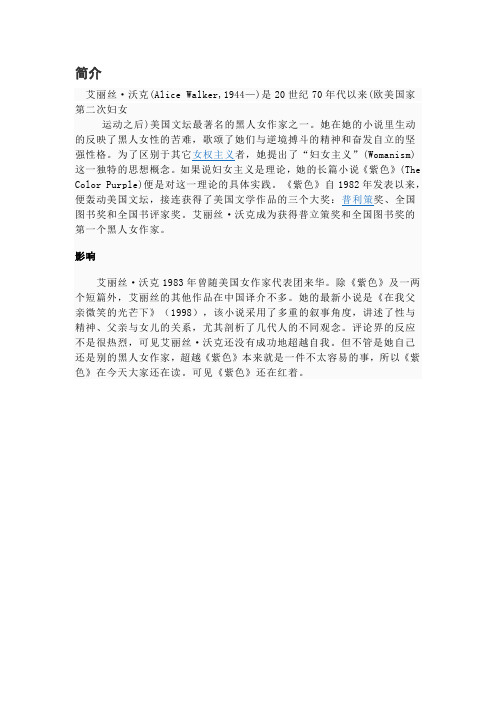
简介
艾丽丝·沃克(Alice Walker,1944—)是20世纪70年代以来(欧美国家第二次妇女
运动之后)美国文坛最著名的黑人女作家之一。
她在她的小说里生动的反映了黑人女性的苦难,歌颂了她们与逆境搏斗的精神和奋发自立的坚强性格。
为了区别于其它女权主义者,她提出了“妇女主义”(Womanism)这一独特的思想概念。
如果说妇女主义是理论,她的长篇小说《紫色》(The Color Purple)便是对这一理论的具体实践。
《紫色》自1982年发表以来,便轰动美国文坛,接连获得了美国文学作品的三个大奖:普利策奖、全国图书奖和全国书评家奖。
艾丽丝·沃克成为获得普立策奖和全国图书奖的第一个黑人女作家。
影响
艾丽丝·沃克1983年曾随美国女作家代表团来华。
除《紫色》及一两个短篇外,艾丽丝的其他作品在中国译介不多。
她的最新小说是《在我父亲微笑的光芒下》(1998),该小说采用了多重的叙事角度,讲述了性与精神、父亲与女儿的关系,尤其剖析了几代人的不同观念。
评论界的反应不是很热烈,可见艾丽丝·沃克还没有成功地超越自我。
但不管是她自己还是别的黑人女作家,超越《紫色》本来就是一件不太容易的事,所以《紫色》在今天大家还在读。
可见《紫色》还在红着。
Alice walker语言风格

Alice walker语言风格
Alice walker语言风格既有强烈的批判性又有传统的积极和乐观态度。
例如其代表小说《紫色》描述了一位受旧思想束缚的黑人妇女的转变和成长过程,充分展现了黑人女性深受性别和种族双重压迫的现实状况和生活境遇,以及对这种双重压迫的反抗和对完善自我及完美生活的渴望与追求,深刻反映了作者的妇女主义思想。
《紫色》还深刻地揭示了妇女主义思想的内涵和对黑人妇女求解放、求平等的积极意义。
如第一人称复数用Us,用大写的He或Pa 指代主角的继父,用Mr-称呼那些不配有姓名的男人等,揭示黑人男女,黑人家庭。
黑人内部的弊病,这种与众不同的语言策略充分体现了作者的黑人意识和民族观念。
Alice Walker
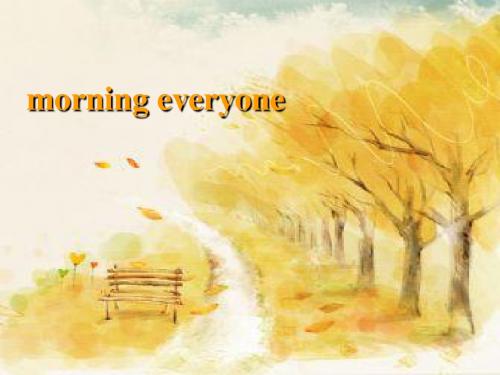
Masterpiece
The Third Life of Grange Copeland (1970) Meridian (1976) The Color Purple(1982) The Temple of My Familiar (1989) Finding the Green Stone (1991) Possessing the Secret of Joy (1992) Devil's My Enemy (2008)
morninBiblioteka everyoneBrief introduction
Alice walker(1944--) Born in Eatonton,Georgia Graduated from Sarah Lawrence College the youngest of eight children Key words:womanism epistolary novel书信体小说 black feminism黑人女性主义 Activism激进主义
Story Background
The short story “Everyday Use”, from the collection In Love and Trouble published in 1973, was written during the heyday of the Black Power movement, when AfricanAmericans were trying to gain racial equality and called for self-determination and racial dignity. African-American short stories of this period often dealt with problematic issues like separation, integration and redefinition of the African American past. Blacks were seeking their cultural roots in Africa, the slogan “Black is beautiful” and the Afro hair style arose. Everyday Use is Alice Walker’s answer to the social discourse of that time, especially concerning the African American concept of heritage and identity.
Everyday Use人物分析兼论其主题
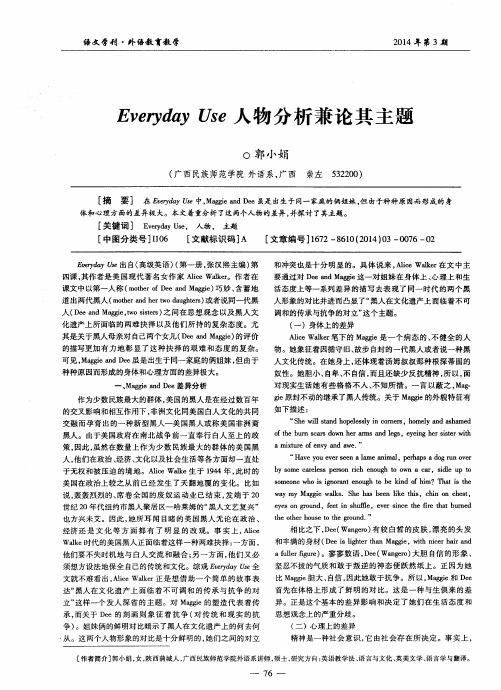
0130 hand.that“110”is a word the world never learned to say to
her.而且 ,Dee(Wangero)面对 白人并 不逆来顺 受 ,委曲求 全 ,
美 国在政治上较 之从前 已经 发生 了天 翻地覆 的变 化。 比如 someone who is ignorant enough to be l(ind 0f him?That is the
说 ,轰轰 烈烈的 、席 卷全 国的 废奴运 动业 已结束 ,发 端 于 20 世纪 20年代 纽约市黑人聚居区一 哈莱姆的“黑人文艺 复兴” 也方兴未艾 。因此 ,她 所耳 闻 目睹 的美 国黑 人无论 在政 治 、 经济 还 是 文 化 等 方 面都 有 了 明 显 的改 观 。事 实 上 ,Alice
other folks’ habits,whole lives upon US two,sitting trapped and
ignorant underneath her voice.She washed I18 in a river of make
— believe.burned US with a lot of knowledge we didn’t necessa-
异 ,彰 显了她 的叛逆 精神 。“Dee is dead,”Wangero said,“I
couldn’t bear it any longer,being named after the people who
oppressed me.”一句极妙的道 出了 Dee的叛 逆精神和决心。 (三 )生 活态度上的差异 在 iV[aggie眼中 ,Dee(Wangero)是一 个 名副 其 实的 生活
TheColorPurple 紫色 爱丽丝 沃克
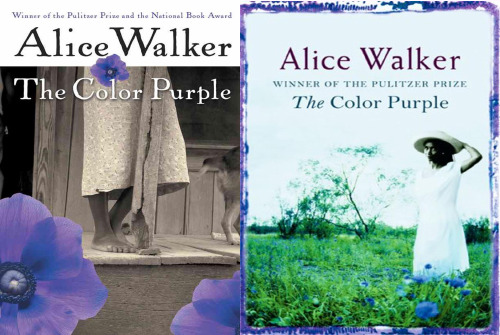
• Later, she is forced into a loveless marriage, leaving her sister Nettie alone with Alphonso. Nettie escapes his sexual advances by moving in with Celie and her husband, Mr. Albert. This arrangement is no better than the previous one and Nettie is again forced to leave. She ultimately ends up in Africa where she writes to Celie of her experiences.
• For Celie, marriage is nothing more than a shift within the quicksands of abuse and male domination. Albert beats her because she is not Shug Avery, the woman he loves but does not have the courage to marry. Surprisingly, Celie and Shug develop an intimate relationship. More than anyone, Shug's influential presence and acceptance give Celie the strength she needs to redefine herself, take charge of her life, and leave Albert.
- 1、下载文档前请自行甄别文档内容的完整性,平台不提供额外的编辑、内容补充、找答案等附加服务。
- 2、"仅部分预览"的文档,不可在线预览部分如存在完整性等问题,可反馈申请退款(可完整预览的文档不适用该条件!)。
- 3、如文档侵犯您的权益,请联系客服反馈,我们会尽快为您处理(人工客服工作时间:9:00-18:30)。
Alice Walker, an activist
• November, 2003: wrote "An Open Letter to Barack Obama" • March, 2009: traveled to Gaza, to persuade Israel and Egypt to open their borders into Gaza • December, 2009: participated in the Gaza Freedom March
Concerns:
• The themes of her works: • rape, violence, isolation, troubled relationships, multi-generational perspectives, sexism and racism. • Interested in examining the relationship among the blacks themselves. • Focus on the struggles of blacks, particularly women. • Their struggle against a racist, sexist, and violent society.
lawyer.
1967: Married Melvyn Roseman Leventhal, becoming the first legally married inter-racial couple ith to a daughter 1972: Taught women’s literature in a college 1976: Divorced
1982: The Color Purple published and Walker was awarded the American Book Award 1983: Awarded the coveted Pulitzer Prize and wrote In Search of Our Mother’s Gardens
Alice Walker’s works
• Novels and short story collections • Poetry collections • Non-fiction
Novels and short story collections
• • • • • • • • • • • • • • The Third Life of Grange Copeland (1970) 《格兰奇·科普兰的第三次生命》 In Love and Trouble: Stories of Black Women (1973) Meridian (1976)《子午》 The Color Purple《紫色》 《紫色》 You Can't Keep a Good Woman Down: Stories (1982) To Hell With Dying (1988) The Temple of My Familiar (1989) Finding the Green Stone (1991) Possessing the Secret of Joy (1992) The Complete Stories (1994) By The Light of My Father's Smile (1998) The Way Forward Is with a Broken Heart (2000) Now Is The Time to Open Your Heart (2005) Devil's My Enemy (2008
Brief introduction of Alice Walker’s life • African American • poet, novelist, essayist and activist
1944: On February 9th 1944 in Eatonton, Georgia, Alice Malsenior Walker was born 1952: In a freak accident, Alice was shot in the eye and she was blind. 1961: She graduated from high school and left for Spelman College, Atlanta, Georgia, later transferred to Sarah Lawrence College near New York City 1962: While at College she became actively involved in civil rights demonstrations 1963: Invited to Martin Luther King’s home she then heard his famous speech “I have a dream” at Washington 1965: Graduated from college and later met Melvyn Roseman Leventhal, a Jewish civil rights
• The role of women of color in culture and history. • In general, her writing explores multidimensional(多面的)kinship among women, among men and women, among humans and animals, and embraces the redemptive power of social, spiritual and political revolution.
Awards and honors
• • • • • • • • • • Pulitzer Prize for Fiction for Color Purple (1983) (first black woman). National Book Award (First black woman) O. Henry Award for "Kindred Spirits" 1985. Honorary Degree from the California Institute of the Arts (1995) American Humanist Association named her as "Humanist of the Year" (1997) The Lillian Smith Award from the National Endowment for the Arts The Rosenthal Award from the National Institute of Arts & Letters The Radcliffe Institute Fellowship, the Merrill Fellowship, and a Guggenheim Fellowship The Front Page Award for Best Magazine Criticism from the Newswoman's Club of New York Induction to the California Hall of Fame in The California Museum for History, Women, and the Arts (2006)
Non-fiction
• In Search of Our Mothers' Gardens: Womanist Prose (1983) • Living by the Word (1988) • Warrior Marks (1993) • The Same River Twice: Honoring the Difficult (1996) • Anything We Love Can Be Saved: A Writer's Activism (1997) • Go Girl!: The Black Woman's Book of Travel and Adventure (1997) • Pema Chodron and Alice Walker in Conversation (1999) • Sent By Earth: A Message from the Grandmother Spirit After the Bombing of the World Trade Center and Pentagon (2001) • We Are the Ones We Have Been Waiting For (2006) • Mississippi Winter IV • Overcoming Speechlessness (2010)
Poetry collections
• • • • • • • • • Once (1968) Revolutionary Petunias and Other Poems (1973) Good Night, Willie Lee, I'll See You in the Morning (1979) Horses Make a Landscape Look More Beautiful (1985) Her Blue Body Everything We Know: Earthling Poems (1991) Absolute Trust in the Goodness of the Earth (2003) A Poem Traveled Down My Arm: Poems And Drawings (2003) Collected Poems (2005) Poem at Thirty-Nine
